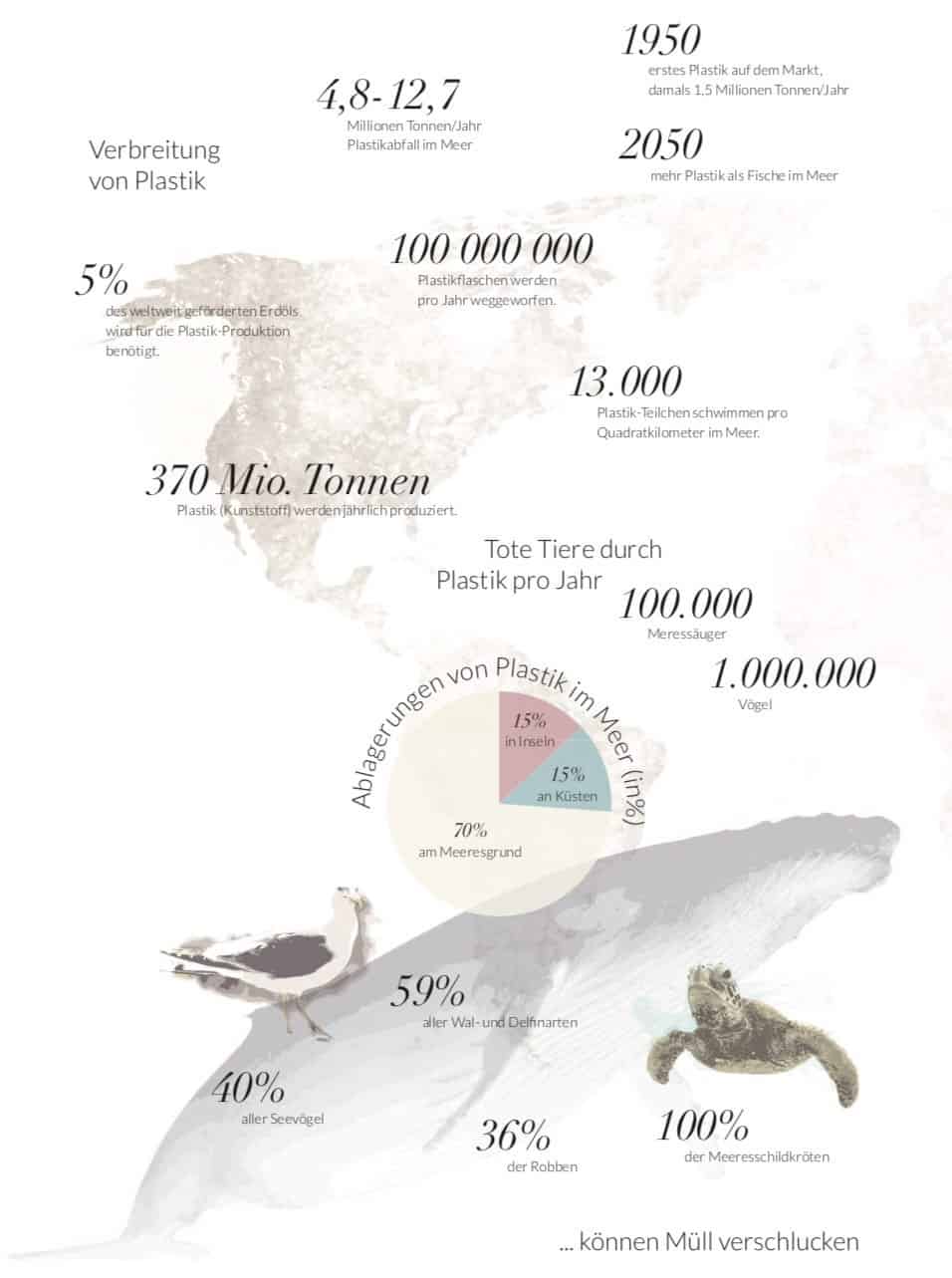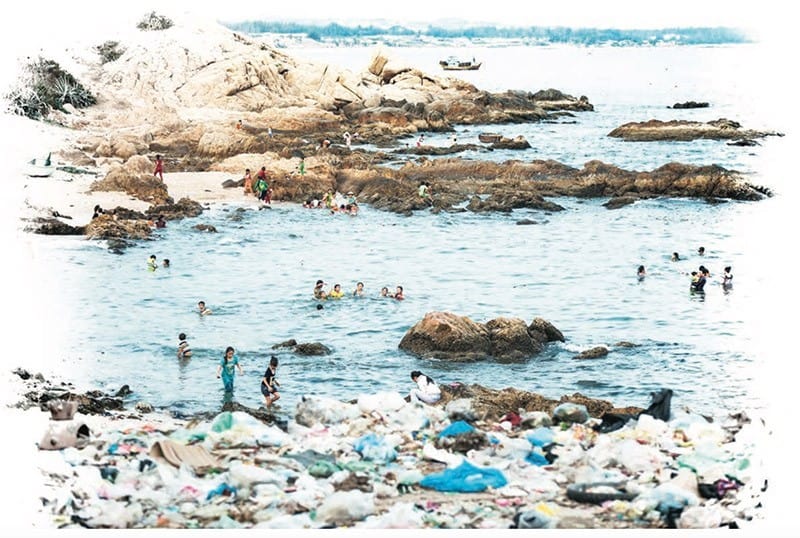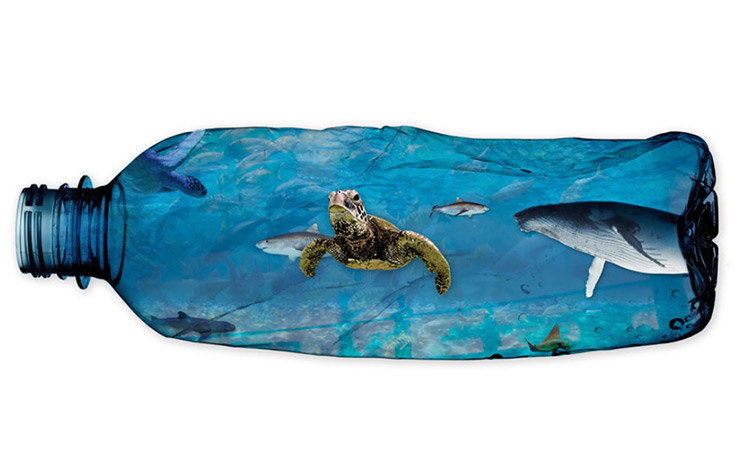At Moon Mountains Magazine durfte ich mich vor einigen Monaten richtig austoben und ein Essay zum Thema Plastikmüll verfassen. Dieses möchte ich dir hier selbstverständlich kostenlos zur Verfügung stellen. Gerade weil es hier um das weitreichende Thema Plastikmüll und das sogenannte „Experiment des Plastozäns“ geht, freue ich mich selbstverständlich über deine persönliche Einschätzung zu der Rolle des Kunststoffs in unserer Gesellschaft in den Kommentaren unter diesem Plastikmüll Essay.
Attentively, my gaze wanders through the small Berlin shared room as I write the plastic waste essay. "Looking for plastic," I call out, fully concentrated, as my roommate pokes his head into the room through the ajar door and sees me twisting on the black desk chair, facing away from the laptop, scanning the walls. Out of the corner of my eye, I see him follow my gaze, but then pull back without comment and quietly close the door.
A game console and half a dozen silicone cases lie dusted in front of an older flat-screen TV.
Next to it still the small, solemnly designed birthday bag with the imprint "Happy Birthday" in illuminated letters. I've told her often enough that I haven't really been into this sweet stuff for years, but somehow my aunt gives me sweets once a year. No matter how old one is. Each one wrapped and packaged in a cape made of plastic.
From my table, I see a large corner of the fruit gum mini mix bag peeking out. Provocative. Almost threatening, as if the gold mommy plastic bag with the little mini mix bags inside knows what I think of it. "How sinful," I think. Almost as sinful as the peeled, plastic-wrapped tangerines that an American supermarket chain offered its customers. As a service, so you don't have to peel the tangerines yourself anymore. Or the plastic-wrapped cans of cola in Asia. Shrink-wrapped cans of cola! (Note: The most absurd plastic packaging)
For reasons of hygiene. While I'm still thinking about the fruit gum mini-mix bag, I gently, barely perceptibly, hear the plastic rotors of the wind turbine that is installed in the field next to our housing estate and supplies us with energy.
The monotonous, hypnotic whirring of the spinning rotor blades and the otherwise absolute silence around me call more images from this plastic temple of a shared apartment into my head: the shrink-wrapped organic bananas in the refrigerator, the almost empty cheese packaging. The plastic trash under the kitchen counter, the dozens of bottles of every size and color hanging behind the door in a discount plastic bag. Whoosh. The bag of toast. Whoosh. The opened chips, the hand cream on our sideboard in the hallway, the coffee-machine-sized bucket of egg whites, the king of all plastic containers looking down at me snidely from the wall cabinets. Whoosh.
In my mind's eye, the Coffee2Go cup mountain on my roommate's desk manifests itself. 320,000 of these cardboard plastic cups end up in the trash in Germany alone after being consumed and used for just a few minutes. Per hour.
That's 2.8 billion cups a year - stacked up a tower 300,000 km high. This would bridge just under 80 % of the distance to the moon. Alternatively, it could circumnavigate the globe more than seven times. Constricting the world in Coffee2Go cardboard and plastic cup garlands...
Suddenly, the sound of a reminder popping up on the blank word document on my laptop snaps me out of the thoughts of my dystopian vision of the end times. "Levy: Trapped in plastic, MONDBERGE," I read quietly and close the reminder with a press of the button on my plastic mouse.

Plastic Age End of the Line?
In terms of earth history, we now live in the Holocene. This epoch began about 11,000 years ago and followed the Ice Age. In 2002, Nobel Prize winner for chemistry Paul Crutzen declared that the earth had long since entered a new age: the so-called Anthropocene. The age of man, as man has gained considerable importance. He has, yes. But not only in a good way. Biologist Lars Gutow calls our age simply "the Plastocene.
In the days when plastic was still a thing of the future, milk was stored in glass bottles and huge jugs and poured into containers brought along for sale. Hairbrushes and Toothbrushes were made of wood. However, since Charles Goodyear set the plastic ball rolling in 1839 with a combination of rubber and sulfur, there has been no stopping it. During the 1950s, one million tons of plastic were produced worldwide, and the development of the PET bottle at the end of 1960 marked the start of an experiment that then really took off in the 1980s. Today, we consume about 370 million tons of plastic every year. 32 million tons end up in nature every year, and about 8 million of these end up in the oceans. So every minute a truckload of plastic is dumped into the ocean, killing 100,000 marine mammals and 1 million seabirds every year (see article Plastic waste in the environment) costs the life. Have we overslept in dealing properly with the benefits of plastic? Since plastic is not biodegradable, after many years it becomes microplastic, plastic particles smaller than five millimeters, due to wind and weather, and thus enters our food chain. (see article Bioaccumulation of toxins - plastics in the food chain)
Microplastics also reach the world's oceans as a result of our cleanliness behavior; even our wastewater treatment plants are powerless in this regard. With every wash cycle, plastic fibers from our machines flow into the waters - also a strong argument for sustainable clothing from organic material! And what a large part of us certainly did not know: many shower gels, shampoos, creams and other Cosmetics contain microplastics. But there are plastic-free alternatives. Who e.g. the App CodeCheck After scanning the selected product, the user knows in a matter of seconds whether it contains plastic ...
With plastic waste, in addition to climate change (see Stop climate change) the biggest environmental problem of our time arose. Of course, I do not negate the inviolable achievements of the human species in medicine and science, because I also benefit from them. The modern world has opened unbelievable doors for us. But when I sit down on the edge of my bed in the evening and pull my socks off my feet, I am overcome by this deep feeling that something can't be right, that something in this world isn't going right. I think about my day, I'm grateful that I'm lying in the warm and have a roof over my head. That I'm healthy, allowed to work in the morning, turn on the radio and "The Police - Walking On The Moon" blares from the speakers. Actually, we did make it. We were on the moon. Everything is growing and thriving. Everything is getting bigger and faster. "The Anthropocene," I hear Paul Crutzen say. The age of man. And yet I have this nervous feeling in my gut. I am developing a consciousness diametrically opposed to the enjoyment of our entertainment landscape, consumerism and the colorful neon signs of downtown Berlin. My thoughts circle, and slowly I slip into a restless sleep. (Note: Article recommendation Sleep better)
The morning after, I remember confused dreams. I saw smoking industries, wasteland, hundreds of roads cutting through cleared forests, up to a horizon emblazoned with a blood-red sun. Directly below me, a calm, lifeless sea and shallow swells. A cool wind blowing and a can clattering against the cliffs. Man consumes and the world dies.
The topic of plastic and the images of dead sea creatures and Plastic waste carpets in the oceans has not let me go. I soon realized that while we in the western countries of the world are moving towards getting a grip on the issue of plastic waste, the much greater evil lies primarily in developing countries, where neither good waste disposal nor a functioning recycling system, let alone the necessary awareness, are in place. For example 80 percent of plastic waste in the world's oceans from Asia.₁ My motivation to do something about it drove me to my Sri Lanka trip. Sri Lanka is one of many developing countries in Southeast Asia for which plastic was too suddenly there.
The trailer, which is pulled through Weligama by a tractor once a day, has long been unable to cope with the waste generated by the collection point. In the few Plastics recycling-The garbage piles up in mountains as tall as skyscrapers. One day, the pelting rain turned one of these mountains into an avalanche of garbage. Numerous people died, more than 600 people lost their homes along with their belongings. Buried by garbage. So far from one's imagination and yet reality. If I hadn't interrupted the cashier at the supermarket, every single apple would have ended up in a plastic bag after my purchase. There is neither bottle deposit nor sufficient trash cans ...
The people are great, hospitable, warm and in some respects further along than we are. More present, I might call it. Does that prevent them from thinking about the future of our ecosystems? Educational work is necessary to counteract the littering in many countries of this earth in the long term and sustainably. I organized joint clean-up campaigns with the residents, so-called Beach CleanUpsto raise awareness of the problem. We cleared places - for hours, for days. Places where no one had kept order for a decade.
But shifting the blame for pollution onto developing countries is too easy. Isn't it Western industry that puts plastic waste into circulation in the first place and shifts responsibility to the consumer? Who is responsible for disposal and recycling? Starting in 2019, there will be a new packaging law, at least in Germany, which is supposed to increase recycling rates with more deposits and less waste incineration.
When dealing with it consciously, I consider Plastic is fundamentally essential. Because yes, it means progress. So far, plastic is the only material that is light, unbreakable, elastic, temperature-resistant and, above all, can be produced in different degrees of hardness. As soon as a rudimentary material comes to light that is similarly flexible, suitable for mass production and hopefully biodegradable, it will make plastic obsolete. Such as polylactic acid (PLA for short), a Bioplastic from corn starch and sugar cane. But so far there is no separate recycling system for plastics made from natural materials because of the small quantities involved. Soy, corn, sugar cane and the remains of shellfish also have the potential to replace plastic in the long term.

Consumption has become easy and convenient. Everything is available immediately, so we don't even bother with the underlying processes anymore. How is packaging created and what becomes of it after it is "disposed of"?
I have fundamentally changed my personal attitude toward plastic. Today, when I climb the stairs to my shared apartment after shopping, I no longer heave up a heavy six-pack of mineral water in plastic bottles with constricting plastic foil. How lucky we are to have Drinking water get free from the tap? The whole thing in a reusable glass or a hip Stainless steel bottle filled: Quality of life increased. And even more plastic-free in the sense of the Zero Waste Lifestyle!
Speaking of shopping: cloth bags or Fruit and vegetable nets can be easily stowed in the bag - just in case. And also on the regional weekly markets as well as in up-and-coming unpacking stores (see article Plastic free shopping) there is hardly any plastic. There, I can fill fruit, vegetables or noodles into containers I've brought with me without leaving any trash behind. Deodorant, shampoo and shower gel also cause an incredible amount of plastic waste. To avoid this, I use them in solid form in one piece or make my own deodorant.
These are all little things that each of us can do to make our day more sustainable. For some, this may not sound like something they can do. Jute bag and glass bottles save our planet. But I think that's exactly what it does. Our actions have an impact. Just like throwing a stone into water ... If you question your own consumption and set an example by adopting this attitude, you can bring about a rethink in our society in the long term. Bottle deposits and rewards for sustainable behavior are effective instruments for motivation. Those who sip their coffee on site in the café or have their drink filled in the thermal mug they brought with them pay less! The reverse version is certainly even more effective: those who order a Coffee2Go pay more. Motivation to rethink. This was also needed in the discussion about plastic carrier bags, which have been subject to a charge in many stores since July 2016. While in 2015 around 5.7 billion plastic bags left German shopping stores, in 2016 there were "only" 3.7 billion plastic bags. (Note: in 2018, only 2.4 billion plastic bags).
One wonders, however, why they still exist in Germany at all, while developing countries like Rwanda, Kenya or Cameroon have long since abolished plastic bags ...
And yet: I am driven by the feeling that the trend towards more conscious consumption is developing into a truly sustainable movement. Zero Waste. Sustainable consumption as a smart lifestyle worthy of imitation, so to speak. People share their experiences and tips in common groups (feel free to come to our Zero Waste Community and Beach CleanUp Community), forums and blogs, they get involved against the existing plastic waste in the sea. Like the young Dutchman Boyan Slat. With The Ocean CleanUp, he wants to use the natural ocean currents and rid the ocean surface of plastic within five years, starting as early as 2018. Or like the scientists who have discovered Ideonella sakaiensis, a bacterium capable of decomposing PET plastic. Likewise, the caterpillars of the great wax moth are able to feed on plastic.
Another sign of a positive development is the first United Nations Ocean Conference, which met in New York in June 2017, even if the results so far have been rather meager. Although, according to the latest studies, plastic waste in the ocean could weigh more than all the shoals of fish together in just 30 years, only 22 voluntary measures to reduce waste were recorded.
Is there a way out of the plastic age?
Yes! Plastic has massively increased our quality of life. But every person on this planet can question his or her personal use of plastic, things reuse and make a contribution through conscious consumption - without necessarily limiting the quality of life. It's about putting ideas into practice, passing on one's knowledge and providing food for thought.
Perhaps we should move out more often into the untouched parts of our world. Out of the offices, out of the daily routine, out of the cities, to the places that man has not yet touched, into nature. (Recommendation: Our Wildlife Blog Germany)
And then to take in the peace that emanates from this great organism, to see the beauty that I want to give up my Coffee2Go to preserve ... I don't know any feeling that is stronger. Healing. Rooting. The alarm clock has long since rung, time to wake up! Because this year, the next 225,000 truckloads of plastic waste will be dumped into the ocean. We are trapped in plastic, if we do not find a way out as soon as possible, the experiment has failed.
Do you share my opinion about our society in the plastic age? Do you have questions, suggestions or your own experiences that you would like to share? Then, as always, I look forward to your comments below this plastic waste essay.
Stay clean,

PS.: Look you with pleasure in the Plastic free blog You'll find the best tips on how to live without plastic. I also put you my Online Course 30 Days to Zero Waste which teaches you how to produce less and less waste in 30 days.
References:
₁ The new Plastics Economy by Ellen MacArthur Foundation





